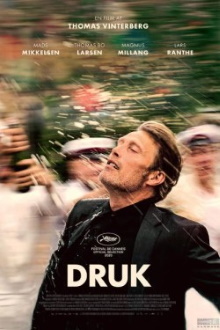Well, it’s not everyday that you get a film that unabashedly champions the drinking of alcohol, but this really is what this is. The premise of this film by director Thomas Vinterberg about a group of middle-aged men who take to drinking to improve their lives sounded promising to me but I thought for sure that they would get their comeuppance at the end as is traditional. Indeed there are consequences but it’s hard to argue that the ending isn’t a net positive for the protagonists. I’m all for artistic freedom and this film is very watchable, but socially I feel that this film sends all the wrong messages.
Martin is a history teacher in Denmark who has become so complacent in his life that his routines at work and at home has made him stale and boring. He is so inattentive and unmotivated at teaching that the parents of the students lodge an official complaint. He meets with a group of his fellow teachers over dinner and the psychology teacher Nikolaj mentions a theory proposed by psychiatrist Finn Skårderud that humans are born with a blood alcohol level that is 0.05% too low and would benefit would being constantly slightly drunk throughout the working day. All four of the friends attempt this experiment by sneaking alcohol into the school and immediately experience an improvement in their teaching skills and ability to socialize. The students in Martin’s class starts enjoying his lessons and even his passion with his wife is rekindled. Nikolaj wants to write a paper about their experiment and emboldened by their success, they try increasing the BAC limit. Though this starts to affect their day to day behavior enough that other people start to notice their inebriation, they find that their lives are still improved.
This is not a commercial film but neither is it a terribly artistic one. Its messaging is heavy-handed and ultimately pretty one-sided. Before beginning his experiment with alcohol, Martin isn’t just boring in his lectures, he is forgetful and mentally absent, justifying the parents’ concern about him being a bad teacher. After he gets drunk, he becomes a wonderful teacher able to inspire and motivate his students and the same goes for the other teachers. Alcohol is made out to be be the ultimate performance enhancer. For reasons that are not entirely clear, they decide to escalate their experiment to the point that they are incapacitated by the alcohol. While trying to get home after a session, Martin falls over in the street and hits his head, spending the rest of the night out in the open. Nikolaj stumbles into bed with his wife and pees on himself. This gets them to end the experiment but the overall lesson is still clear: short of being stone blind drunk to the point where you can’t walk around straight, alcohol is wonderful and gives meaning and happiness to otherwise stale and joyless lives.
I do have to give the film credit for being so unapologetic and bold in advocating what must be even in Denmark a rather controversial opinion. The final scenes leave the audience in no doubt whatsoever how much joy imbibing alcohol brings back to Martin’s life and also how important a role it serves as a social lubricant and as the centerpiece of celebratory events. The joie de vivre the film evokes is palpable and is probably why this film is so well liked. Yet it’s dishonest, brushing past the debilitating effects of alcohol and skipping past some dangers. For example, the characters are shown to be extremely careful to never drive while drunk. This is commendable but it’s hard to believe that such discipline is universal. The film similarly shows that the consequences of excessive drinking fall mainly on those drinking themselves with minimal fallout for their families or wider society. As we all know, this is not true and the harmful effects of alcohol consumption on society is well documented.
This is a film that I really want to like because it’s so bold and yes, it’s fun to watch. But I strongly disagree with its messaging and reiterate that the medical establishment is coming around to the conclusion that no amount of alcohol is safe for consumption. Even the theory mentioned in the film is misleading. Skårderud did write it but only as a preface to a book published in 1880 and not as a real proposal at all. In the end, it’s fine if you treat this film as a kind of black comedy but it’s also important to understand that nothing in it is true and it isn’t meant to be serious.
